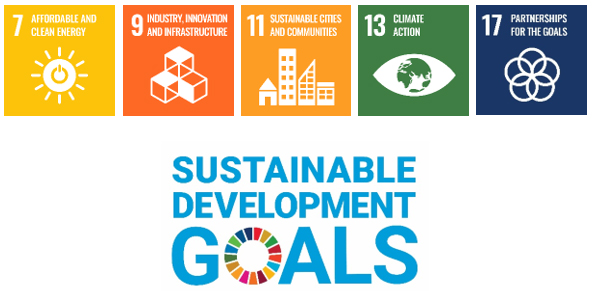Group Action Plan to Realize Decarbonized Society
Mitsui Fudosan to Convert All Facilities to ZEB/ZEH in Japan
by FY2030 Expand Mega Solar Business Five-fold
Aggressive promotion of offshore wind and geothermal energy creation;
Introduction of ICP from FY2022
November 24, 2021
Mitsui Fudosan Co., Ltd.
Key Points of Press Release
• Formulation of Group Action Plan (Roadmap) up to FY2050
< New Target for Decarbonization >
Raising to 40% the reduction rate of greenhouse gas emissions by FY2030
(Reduction of approximately 1.75 million t/year compared with FY2019 emissions of 4.38 million t/year, which is equivalent to approximately 1 million households' annual CO2 emissions*1)
< Key Initiatives >
Establishment of “Sustainability Promotion Dept.” to realize the Action Plans, and introduction of the Internal Carbon Pricing System (ICP) from FY2022
- Toward FY2030
- Achieve ZEB/ZEH level environmental performance in all new construction in Japan Proactively improve the environmental performance of existing facilities.
- Expand the use of renewable energy and green power*2 to all facilities in Japan
- Expand the mega-solar business five-fold (380 million kwh). Secure a power generation amount equivalent to the electricity used by all facilities owned in the Tokyo metropolitan area*3
- Strengthen partnerships to decarbonize the entire supply chain, including efforts to reduce CO2 emissions during construction and the use of forests
- Looking ahead to FY2050
- Promote open innovation for the creation of new technologies, through the energy creation projects on offshore wind and geothermal power, research and development with academia, the University of Tokyo, and construction companies, investment in ventures, and provision of sites for demonstration experiments
- Synergizing the above, build a mechanism of the creation of neighborhoods to promote decarbonization in the entire area
< Roadmap Image for FY2050 >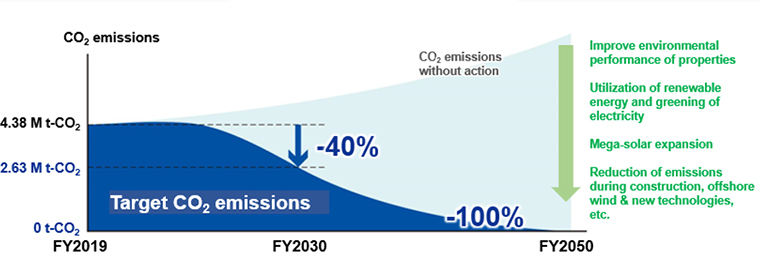
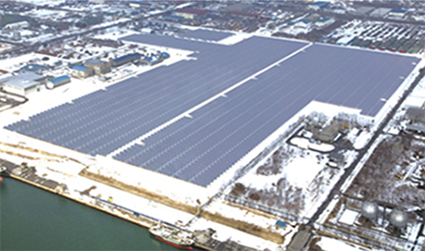
Our mega-solar business: Tomakomai City, Hokkaido
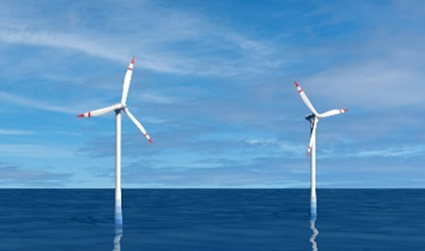
Offshore wind power generation (image)
- 1: Annual emissions at the electricity consumption of general households calculated based on "4-6 Carbon Dioxide Emissions from Households (FY2019)" by the Japan Center for Climate Change Actions
- 2: Electricity equivalent to our share of common areas (including partially owned, excluding electricity equivalent to in-house power generation within each facility).
- 3: Equivalent to the current electricity consumption of all facilities in the Tokyo metropolitan area
Tokyo, Japan, November 24, 2021 – Mitsui Fudosan Co., Ltd., a leading global real estate company headquartered in Tokyo, announced today that the company has raised its GHG reduction rate target. Going from the medium- and long-term targets for GHG that were set in December 2020, it has now raised the reduction rate target for FY2030 to 40% (compared with FY2019) and formulated the “Group Action Plan to Realize Decarbonized Society (Roadmap)” (Action Plan hereinafter) to achieve net zero emissions in FY2050, in order to take concrete actions.
As symbolized by the " " mark, the Mitsui Fudosan Group has been contributing to the development of society and the economy as well as the preservation of global environment. It has done so under the principles of "Coexist in Harmony with Society," "Link Diverse Values," and "Achieve a Sustainable Society," guided by the Group Vision "
" mark, the Mitsui Fudosan Group has been contributing to the development of society and the economy as well as the preservation of global environment. It has done so under the principles of "Coexist in Harmony with Society," "Link Diverse Values," and "Achieve a Sustainable Society," guided by the Group Vision " " .
" .
In recent years, global interest in and the importance of action against climate change has been increasing, as exemplified by the Paris Agreement, an international framework for the prevention of global warming, and the government's new target for decarbonization set in April 2021. In response to these trends, we have decided to create the Action Plan as a comprehensive and concrete strategy to achieve our targets.
Based on the Action Plan, the Mitsui Fudosan Group will expand the scale of its facilities for introducing energy-saving measures and renewable energy, as well as its mega-solar business, looking to FY2030, and will strengthen its partnerships to reduce CO2 throughout the supply chain. Looking ahead to FY2050, we will work together with various partners to study and promote energy creation businesses by utilizing new technologies such as offshore wind and geothermal power generation, and through open innovation to decarbonize.
Mitsui Fudosan participates in various initiatives on climate change action.

■Targets set in Action Plan

The amount of GHG emissions to be reduced by achieving the above targets by FY2030 is 1.75 million tons, which is equivalent to the annual CO2 emissions of approximately one million households*.
* Calculated based on "4-6 Carbon Dioxide Emissions from Households (FY2019)" by the Japan Center for Climate Change Actions
As a level to keep the global average temperature rise due to global warming below 1.5 degrees Celsius, we aim to reduce the Group's emissions in SCOPE 1+2 by 46.2% compared to FY2019.
For more information on the Action Plan, please click here.
https://www.mitsuifudosan.co.jp/english/esg_csr/carbon_neutral/pdf/carbon_neutral.pdf
< Action Plan Overview >
■ Initiatives for FY2030
(1) Improvement of environmental performance in new and existing properties
We will achieve ZEB/ZEH level environmental performance in all new construction in Japan. In addition, for existing facilities, we will improve energy efficiency through strategic renovation and actively promote the creation of on-site renewable energy.
- Achieve ZEB/ZEH level environmental performance in new construction
ZEB/ZEH level: BEI level with environmental performance equal to or higher than ZEB/ZEH Oriented
* BEI (Building Energy Index) is an evaluation index for the energy performance of homes and buildings established by the Ministry of Land, Infrastructure, Transport and Tourism. It is calculated by dividing the design primary energy consumption by the reference primary energy consumption. The concept is based on the Building Energy Conservation Act.
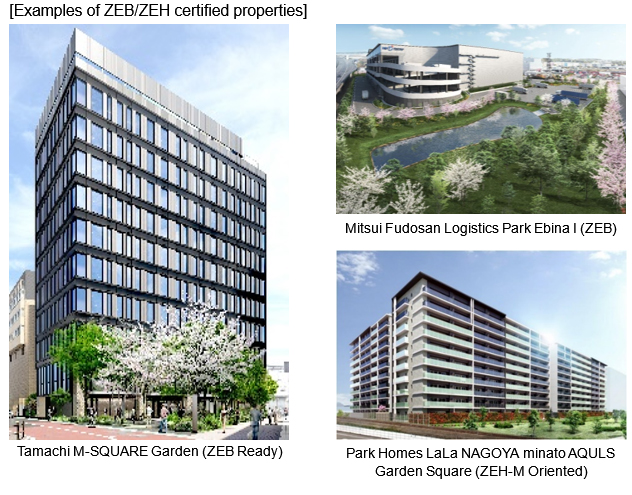
- Examples of improved energy efficiency performance in existing facilities:
On-site power generation and supply on the premises of logistics and commercial facilities by installing solar panels on the rooftops, etc., conversion to LED lighting and optimization of lighting intensity in office buildings, efforts to reduce impact by air conditioners in hotels and commercial facilities, etc.

(2) Proactive use of renewable energy, nationwide expansion of target facilities
(ⅰ) Expanding the use of green electricity* to all facilities in Japan
We will take the lead in the use of renewable energy by expanding the scope of our own facilities (common areas) in the Tokyo metropolitan area set for greening of power consumption by FY2030 to "all facilities in Japan."
* Electricity equivalent to our share of common areas (including partially owned, excluding electricity equivalent to in-house power generation within each facility).
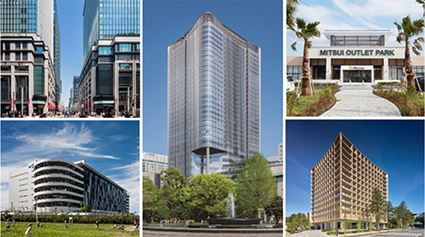
Examples of facilities owned by Mitsui Fudosan
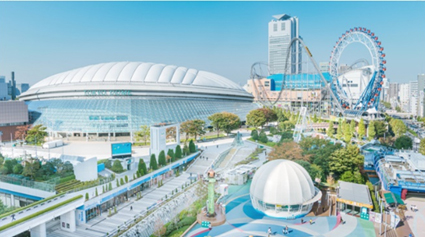
(ⅱ) Expansion of services using renewable energy for tenants, investors, and residents
In April 2021, we launched the "Green Energy Supply Service" using renewable energy to help tenant companies of our facilities solve ESG issues and achieve RE100, and currently about 100 companies are using or considering this service.
We will respond to diverse needs such as the growing interest in environmental considerations in recent years. To this end, we will expand the scope of services utilizing renewable energy to all facilities nationwide, including the provision of a system for greening of power consumption to purchasers of condominiums and facilities for investors sold by the Mitsui Fudosan Group.
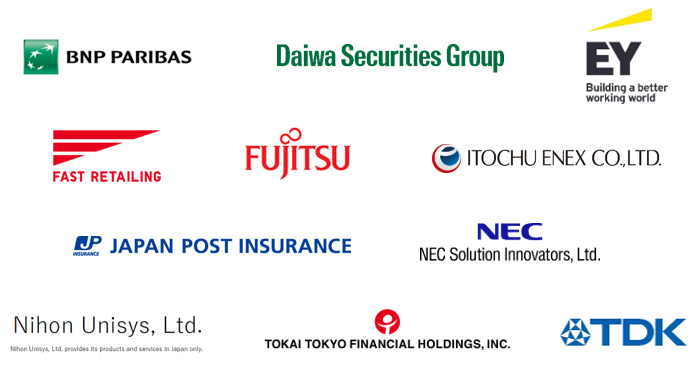
Companies using the "Green Energy Supply Service"
(Some of companies using the system as of October 31, 2021, ABC order)
< Future initiatives >
- Proposal of "Green Energy Menu" to institutional investors at the time of property sale
- In mid- to high-rise condominiums, introduce the mechanism of "bulk high-voltage power reception × Renewable energy" and ENE-FARM
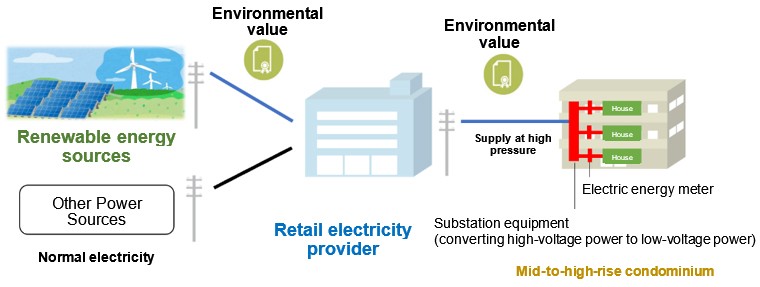
(3) Securing stable electricity supply by expanding mega-solar business and renewable energy capacity
At Mitsui Fudosan, we are currently promoting a mega-solar business at five locations throughout Japan. By FY2030, the scale of our business will be expanded to 380 million kwh per year*, approximately five times the output in FY2019, to secure power generation equivalent to our own use in the Tokyo metropolitan area.
In addition, in the Tokyo metropolitan area, we have secured a procurement of 600 million kwh/year through a comprehensive agreement with TEPCO Energy Partner, Inc. based on the agreement concluded in December 2020. Through further cooperation with other companies, we will strive to secure a total of 800 million kwh/year or more of the non-fossil certificate by FY2030 as well as additional non-fossil certificates throughout Japan outside the Tokyo metropolitan area as needed.
* Total output of 80 M kwh per year in FY2019 Total output of approximately 247,000 kW
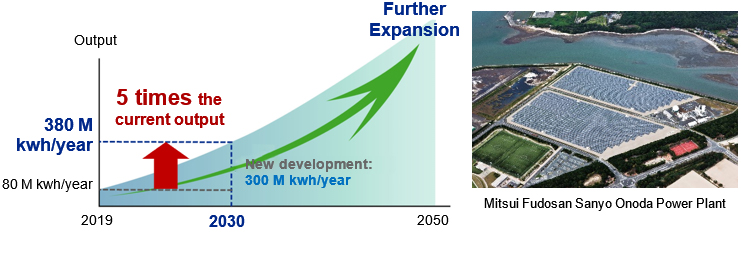
(4)Other initiatives
ⅰ. Strengthening partnerships throughout supply chain to reduce CO2 emissions during construction
We will develop tools to accurately grasp CO2 emissions during construction, and require submission of a reduction plan by construction companies, etc. and promote CO2 reduction in the entire supply chain, involving construction companies and component manufacturers.
< Specific reduction measures >
1. Accurate understanding of CO2 emissions during construction
- In order to accurately grasp the amount of emissions at the time of construction and appropriately reflect the reduction effects, etc., introduce a mechanism for calculating the amount of emissions during construction based on the "method of accumulating actual results of materials used (tentative name).”
- Develop "tools for calculating emissions during construction" by the end of FY2022 in collaboration with academic experts and design engineers.
- By the end of FY2023, require all builders to calculate "CO2 emissions during construction" using the above tools.
2. Reduction of CO2 emissions during construction
- Revision of design guidelines and estimate guidelines. Require Use of low-carbon materials and means, reduction of emissions at construction sites, procurement strategy for materials, and a submission of “CO2 reduction plan during construction.”
* A method of calculating CO2 emissions by adding up the actual emissions from materials and equipment, etc. used. In the past, the method of calculating CO2 emissions during construction was generally adopted by multiplying the construction cost by the emission intensity. But there was an issue that the CO2 emission reduction effect of introducing materials and equipment with a high energy-saving effect could not be properly reflected.
ⅱ. Utilization of forests owned by Mitsui Fudosan
Mitsui Fudosan Group owns and manages approximately 5,000 hectares of forests mainly in the northern Hokkaido region, and we are actively using these forests for the main members of wooden rental buildings and houses, as well as for the finishing materials of various facilities. Through these forest conservation activities and the utilization of timber, we will achieve self-sufficiency in building materials and a sustainable virtuous cycle between forest resources and the local economy.
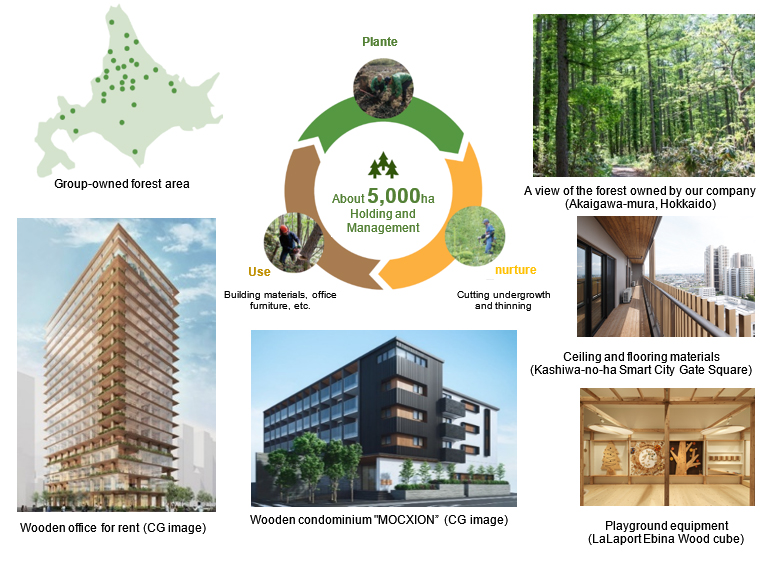
ⅲ. Proactive acquisition of external certifications
In addition to improving the environmental performance of all our facilities, we will actively acquire various external certifications in Japan and overseas to promote ESG, including decarbonization.
Reference: Examples of certified facilities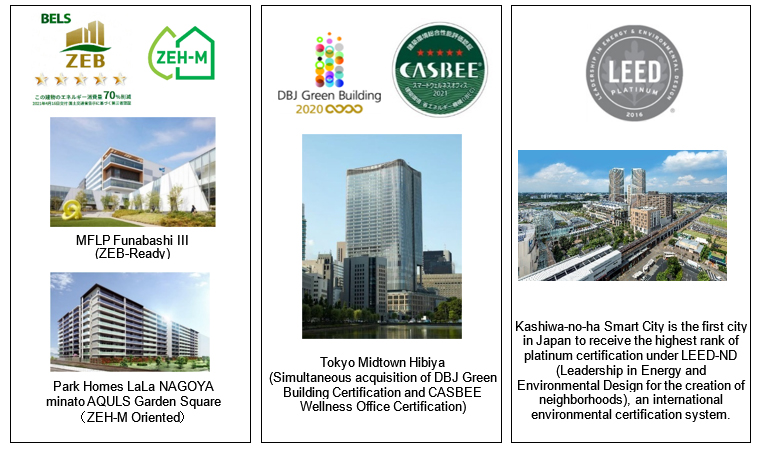
■Various Challenges toward Decarbonization by FY2050
(1) Open innovation for the creation of new technologies
We will keep abreast of trends in technological innovation towards decarbonization. We will proactively pursue the use of new renewable energy technologies such as offshore wind and geothermal power generation, as well as the development of new energy creation projects. Furthermore, we will contribute to the decarbonization of society through open innovation. This includes joint research with the University of Tokyo, research and development with academia and construction companies, investment in venture companies, and the “provision of a place” where demonstration experiments can be conducted.
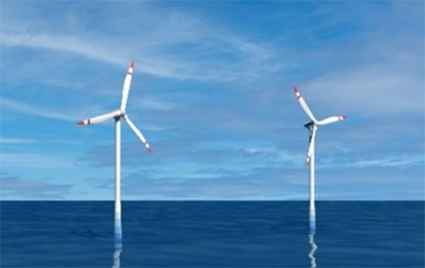
Offshore wind power generation
(image)
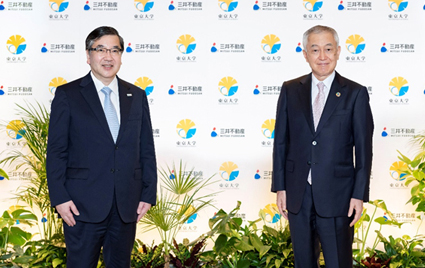
Joint research with the University of Tokyo
“Mitsui Fudosan The University of Tokyo Lab”
(Situation at the time of the conclusion of the industry-academia partnership creation agreement in July 2020)
(2) Promotion of initiatives in the creation of neighborhoods
With the aim of realizing a decarbonized society, we will use new technologies and open innovation, such as the Smart Energy Project in Nihonbashi, Toyosu, and Yaesu, and Kashiwanoha AEMS, to realize the creation of neighborhoods that promotes decarbonization not only of our facilities but of the entire area.
*AEMS: Area Energy Management system
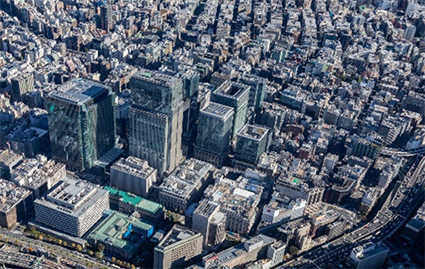
Nihonbashi Smart Energy Project
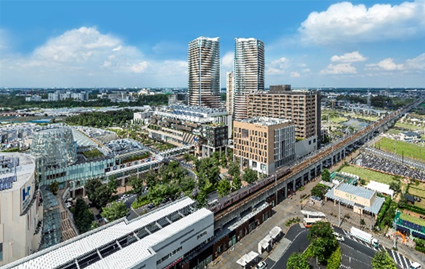
Kashiwa-no-ha Smart City
■Internal systems to promote Action Plans
(1) New organizational structure
As of October 1, 2021, the Sustainability Promotion Department was established as the main body for promoting the Action Plan. The new department will work closely across corporate divisions, including the business units responsible for company-wide energy management, to vigorously promote initiatives for decarbonization.
(2) Introduction of Internal Carbon Pricing (ICP) System
From FY 2022, we will introduce the "Internal carbon pricing (ICP) System" a system to price CO2 emissions from newly developed properties and encourage decarbonization efforts and by quantitatively visualizing environmental impact and monitoring CO2 emission reduction, we will raise group-wide awareness of reducing CO2 emissions and accelerate decarbonization efforts.
Mitsui Fudosan Group’s Contribution to SDGs
https://www.mitsuifudosan.co.jp/corporate/esg_csr/
The Mitsui Fudosan Group is promoting ESG management, i.e., business promotion with an awareness of the environment (E), society (S), and governance (G), with the aim of creating a society in which people and the Earth prosper together, based on the principles of "Coexist in Harmony with Society," "Link Diverse Values," and “Achieve of a Sustainable Society.” By further accelerating the ESG management in our Group, we will make a significant contribution to the realization of "Society 5.0" advocated by the Japanese government and the achievement of the SDGs.
* The initiatives in this press release contribute to the five Sustainable Development Goals (SDGs).
| Goal 7 | Affordable and Clean Energy |
|---|---|
| Goal 9 | Industry, Innovation and Infrastructure |
| Goal 11 | Sustainable Cities and Communities |
| Goal 13 | Climate Action |
| Goal 17 | Partnerships for the Coals |
